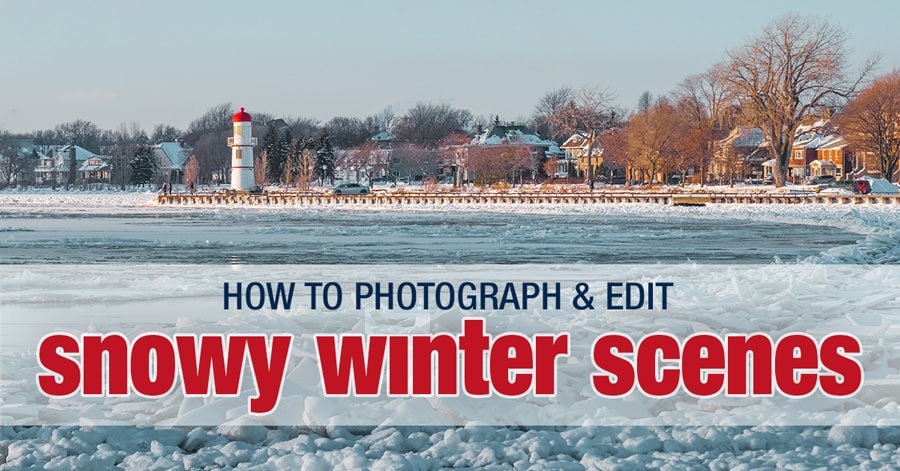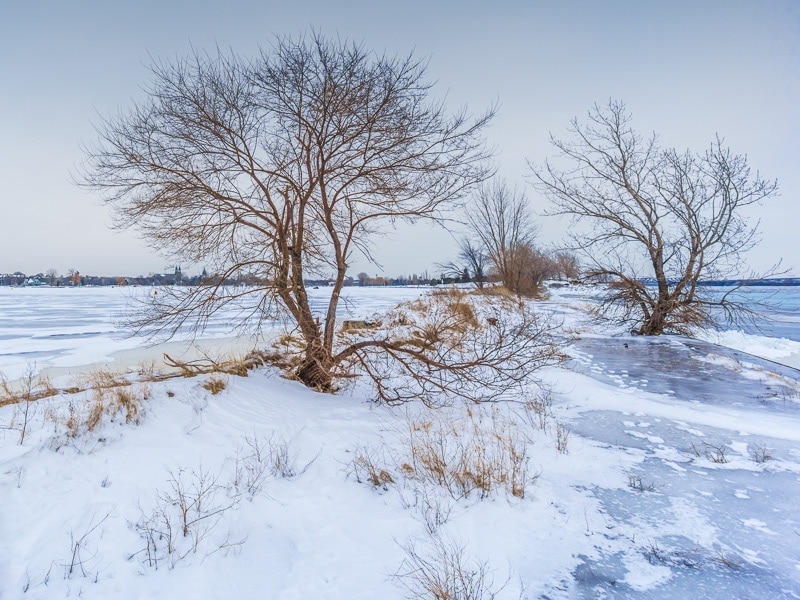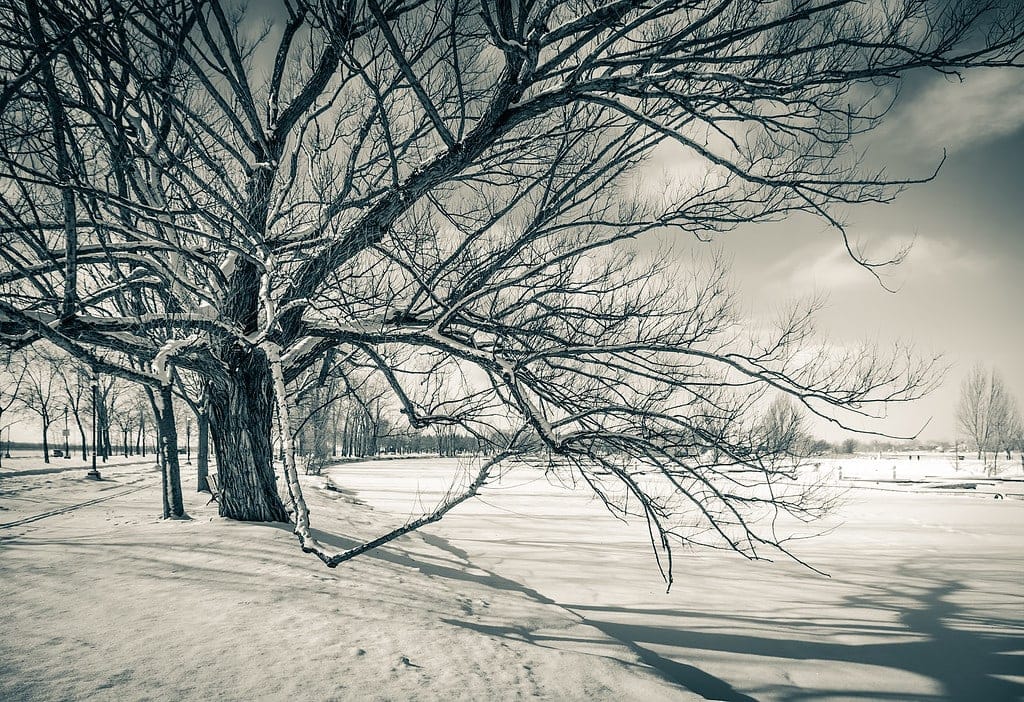Do you wish to know my favourite snow images ideas to enhance your winter images?

The winter season presents panorama and journey photographers distinctive alternatives that can’t be replicated.
Right here, in Montreal, now we have lengthy winters with loads of snow. As a rule, I can shoot snowy landscapes from the center of December till the top of March. And at this time, I wish to share with you ways I strategy winter images.
Since capturing and enhancing winter landscapes presents a unique set of challenges, I’ve separated this text into two elements. First, we sort out the challenges of capturing and, then, we tackle the challenges of post-processing.
Snow Images Ideas: Capturing
The principle problem of photographing snowy landscapes is the predominantly white shade.
The white tends to idiot the digicam’s metering programs by making it consider that the scene is far brighter than it truly is. To compensate, the metering system lowers the publicity and, in consequence, we get underexposed pictures with ugly gray snow.
Under are my favourite ideas and strategies on methods to correctly expose snowy landscapes.
01. Shoot in RAW
The RAW format provides you a much wider latitude to right your errors in post-processing. The logic right here is straightforward: you attempt to accumulate as a lot info from the scene as attainable and determine what to do with it later.
Associated: RAW vs JPEG

02. Use Publicity Compensation
That is my favourite approach—the one I at all times use when capturing snowy landscapes.
Since I do know upfront that my digicam’s metering system will probably be deceived by the abundance of white snow, I set the publicity compensation worth between +1 and +2 stops for all my pictures.
I have a tendency to not tweak the publicity compensation worth for each shot and contemplate the +1 worth to be a dependable center floor for many pictures. I discover that it’s a lot less complicated to do the ultimate positive tuning in post-processing.


03. Do Not Belief Your Digicam or Your Eyes
When capturing winter landscapes, choosing the right publicity is at all times a positive stability. The purpose is to make sure the snow in your images is as white as attainable with out being pure white (clipped). As quickly as any given pixel in your {photograph} turns white, it now not carries any info and it’s unattainable to get well any knowledge from it throughout enhancing.
As you already know, you can’t belief the metering system when capturing snowy scenes. However, on the similar time, you can’t rely solely in your eyes when taking a look at your digicam’s LCD display screen or digital viewfinder as a result of it’s not attainable to differentiate pure white from virtually pure white.
The mathematics is the one fact right here.
Associated: Good Publicity With Each Shot
You should verify the histogram, which is the graphical illustration of the pixels distributed within the picture, to see in case your picture comprises pure white pixels.


04. Bracket All Your Pictures
Bracketing all of your winter pictures serves two major functions. First, it provides you a chance to pick the picture with the proper publicity when you miscalculated the publicity worth or in case your digicam was fooled by the brightness of the scene.
Associated: Bracketing in Images
Second, it means that you can use the HDR enhancing approach in case the scene’s dynamic vary exceeds the dynamic vary of your digicam sensor. Whenever you can’t seize the complete vary of sunshine in a single shot, you’ll be able to at all times mix the bracketed pictures into the HDR picture.
05. Use the Lens Hood
First, I at all times advocate conserving the lens hood on always to guard the delicate and costly glass from unintentional harm. However, when capturing the snow, the lens hood can be a really efficient device for decreasing the glare from the snow.

Winter Images Ideas: Modifying
Modifying snowy winter scenes has its personal distinctive difficulties and hurdles. The principle situation is the predominance of 1 shade (white), making most winter pictures monochromatic. Artistic choices are extra restricted with snowy winter landscapes than colourful scenes of autumn landscapes.
I developed the Winter Colours Assortment as a part of my Lightroom preset library. Every preset within the assortment was designed to beat the assorted challenges of enhancing snowy landscapes and provide you with extra creative prospects to select from.
06. Take away Blue Shade Solid
Whenever you shoot sunny winter scenes with the open sky, it’s virtually assured that the snow could have an unnatural blue shade forged within the shadowy areas. It’s because the scenes have two gentle sources: the daylight and the skylight. After they combine collectively, they produce pure gentle. However, within the shadowy areas, the daylight is shielded, making the skylight the principal gentle supply. Consequently, it shifts the pure gentle towards the blue spectrum.
The most typical technique to remove the blue shade forged is to regulate the colour stability within the digicam earlier than capturing or later in post-processing. I’m not too keen on this selection as a result of, by shifting the colour stability towards hotter tones, you remove the blue shade forged in shadow areas whereas additionally introducing a yellow forged in open areas that makes the snow yellowish.
My resolution is to desaturate the blue colours within the {photograph} whereas boosting the opposite colours.
I’ve the Crisp Morning preset within the Winter Colours Assortment that does precisely that.



(Preset: Crisp Morning)
07. Deliberately Introduce the Shade Solid
For creative functions, attempt to introduce the colour forged to simulate the nice and cozy colours of the sundown—for instance, when the snow by no means seems to be pure white.
My Winter Colours Assortment has three presets that introduce numerous shade casts to pure winter scenes.

(Preset: Ice Sample).

(Preset: Candle Mild).
08. Revive Gloomy Overcast Scenes
On winter days when the 2 major sources of sunshine—the solar and the sky—are shielded by overcast clouds, the panorama tends to be at its most boring and bland with out a trace of any colours. My resolution is to be very aggressive with saturation and distinction. The purpose is to revive any hidden colours and emphasize the snow’s texture and the ice.
I created the Snowflake preset particularly for overcast winter pictures. However, when you apply it to {a photograph} with a wide-open sky and a blue shade forged, the outcome will probably be horrendous.


(preset: Snowflake)
09. Use Black & White Remedy
Due to the monochromatic nature of winter landscapes, it is rather efficient to make use of black and white conversion. This works with just about any snowy scene. You discard the colour info from the picture and focus on the tonal vary as a substitute. Utilizing distinction and readability changes, you will be rather more aggressive in your enhancing.

(Preset: Lifeless)
10. Use Duotone Remedy
The duotone approach is whenever you introduce a second shade to a black and white picture. The approach was broadly used through the printing press period to save cash on manufacturing through the use of solely two colours as a substitute of 4. Nowadays, the duotone approach is generally used for creative functions.
Lightroom can simply obtain the duotone impact by changing a photograph to black and white after which introducing a second shade utilizing the Break up Firming device.

(Preset: Chilly Fingers)

(Preset: Tough Edges)
Snow Images Ideas | Conclusion
Snow images is a improbable technique to seize the fantastic thing about nature. With easy capturing and enhancing ideas and follow, you’ll be able to create gorgeous pictures of your winter panorama.

